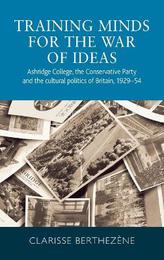
|
Training Minds for the War of Ideas: Ashridge College, the Conservative Party and the Cultural Politics of Britain, 1929-54
Hardback
Main Details
| Title |
Training Minds for the War of Ideas: Ashridge College, the Conservative Party and the Cultural Politics of Britain, 1929-54
|
| Authors and Contributors |
By (author) Clarisse Berthezene
|
| Physical Properties |
| Format:Hardback | | Pages:288 | | Dimensions(mm): Height 234,Width 156 |
|
| ISBN/Barcode |
9780719086496
|
| Classifications | Dewey:324.2410409043 |
|---|
| Audience | | Tertiary Education (US: College) | | Professional & Vocational | |
|---|
|
Publishing Details |
| Publisher |
Manchester University Press
|
| Imprint |
Manchester University Press
|
| Publication Date |
1 June 2015 |
| Publication Country |
United Kingdom
|
Description
This book examines attempts by the Conservative party in the interwar years to capture the 'brains' of the new electorate and create a counter-culture to what they saw as the intellectual hegemony of the Left. It tells the fascinating story of the Bonar Law Memorial College, Ashridge, founded in 1929 as a 'College of citizenship' to provide political education through both teaching and publications. The College aimed at creating 'Conservative Fabians' who were to publish and disseminate Conservative literature, which meant not only explicitly political works but literary, historical and cultural work that carried implicit Conservative messages. This book modifies our understanding of the history of the Conservative party and popular Conservatism, but also more generally of the history of intellectual debate in Britain. It sheds new light on the history of the 'middlebrow' and how that category became a weapon for the Conservatives. -- .
Author Biography
Clarisse Berthezene is a Lecturer at the University of Paris Diderot -- .
Reviews'...fascinating account of Bonar Law Memorial College, Ashridge...' Colin Kidd, London Review of Books, February 2016 'Berthezene's ground-breaking scholarship valuably manages to open up various new avenues for exploring the intellectual history of the Conservative Party.' David Thackeray, University of Exeter, Twentieth Century British History, Vol 27, No. 1, 2016, pp. 144-169 'In the hands of a lesser scholar, a history of Ashridge College could easily have been dry and uninspiring-particularly as some of the richer sources, such as the College's course programs and lecture texts, no longer exist. Berthezene, however, deftly skirts these issues by integrating administrative records with published works and personal papers. The result is a book that both brings to life the history of an influential but forgotten institution, while simultaneously using Ashridge College as a vehicle to explore the political culture of the Conservative Party. Her decision to trace the history of the College across the pre and post-war periods is especially welcome in a historiography that all too often treats these two periods as discrete eras.' ' The result is a work that brings to life the creation of a particular and important mid-century Conservative mentalite and the way it was disseminated and contested within and without the Party.' ' the book should thus form essential reading for anyone interested in British political, intellectual, social and cultural history in the period. Strongly recommended.' Kit Kowol, Contemporary British History, Vol 30, 2016 'For those interested in this theme, Berthezene's [new book] will be indispensable.' Andrew Gimson, Conservative Home, July 2016 'Historians of interwar Britain and the Conservatives owe an immense debt to... Clarisse Berthezene. [She is] able to bring key aspects of the new political history to bear on both the foreign policy of appeasement and the interwar Conservative hegemony. Never again can historians look at appeasement without considering gender, nor can they contemplate the interwar Conservative Party as one lacking a substantive intellectual tradition.' Matthew Hendley, SUNY Oneota, The Journal of British Studies, Vol 5, Issue 4, October 2016 'Extending the work of Phillip Williamson in recontextualizing Baldwin-era Conservatism, (Berthezene's) her new study provides a series of interesting chapters taking in the Tory view of history and the use of book clubs to capture the so-called 'intelligent centre' against the advance of Victor Gollancz and his Left Book Club. The former chapter in particular should be required reading for advanced undergraduate students wanting top marks for their historiography. (...) Berthezene successfully shows throughout how Ashridge sought to provide an intellectual spine to the leadership's work in this regard. (...) Berthezene has provided an interesting study that should find its way onto third-year undergraduate reading lists and thesis bibliographies alike. She charts the evolution of a particular organization which had wider ramifications for the ebb and flow of British politics. In doing so she has delivered a welcome service, for it is a fine work.' Richard Carr, The Journal of the Historical Association, Volume 101, Issue 348, December 2016, pp. 806-808 'Berthezene has provided an interesting study that should find its way onto third-year undergraduate reading lists and thesis bibliographies alike. She charts the evolution of a particular organization which had wider ramifications for the ebb and flow of British politics. In doing so she has delivered a welcome service, for it is a fine work.' 'This is an important and immensely stimulating book. It deserves to be widely read, not as the last word on a very complex subject, but as a launching-pad for much further research and discussion. Indeed, Dr Berthezene bids fair to join that distinguished band of French historians, from Taine and Tocqueville through to Boutmy and Halevy, who for nearly two centuries have taught British readers and citizens many facts and insights about ourselves that we do not learn from our native commentators.' -- .
|